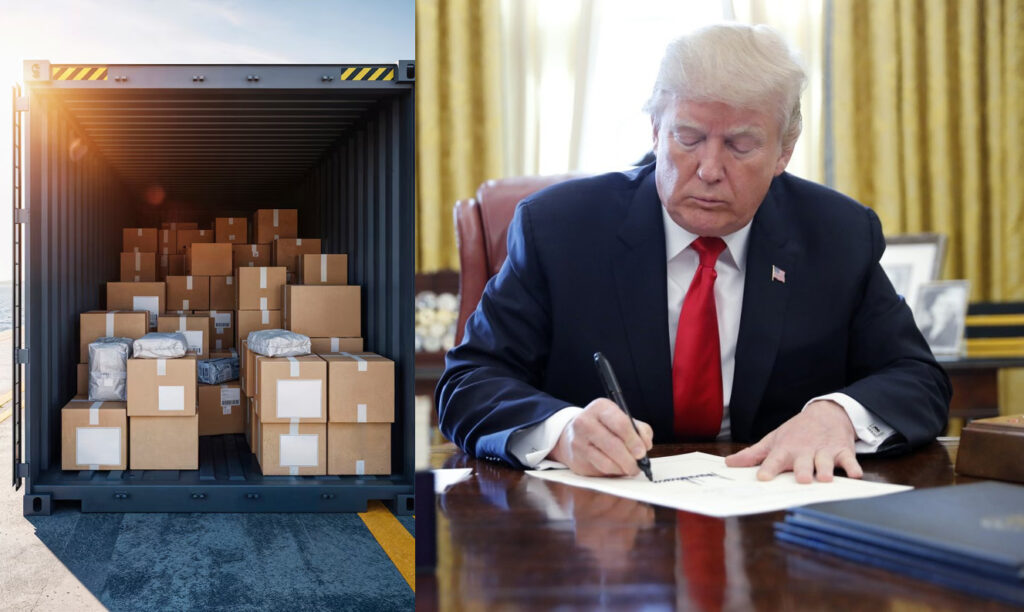Japan, Australia, and Taiwan have now joined the list of countries that are stopping some parcel shipments to the United States. This comes after the Trump administration announced new rules that end tariff exemptions on small imports.
A long-running rule that allowed low-value goods to enter the country without customs duty, known as the “de minimis” exemption, is set to end on coming Friday. President Donald Trump signed an executive order on 30th July that shuts down this exemption, which for years allowed packages worth less than $800 to enter the U.S. duty-free. The order, which takes effect on 29th August, is part of his broader protectionist trade campaign.
For shoppers and companies alike, the regulation was a major deal. It facilitated cross-border online shopping as speedier, easier, and less costly. But with the exemption eliminated, millions of packages that used to move freely daily will now be subject to customs charges, forms, and delays. Delivery firms globally are already responding, and the impacts are set to hit American consumers.
The US government says this step is necessary to slow down the huge flow of cheap imports into the country and to protect domestic manufacturing. But this sudden move has caused disruptions in postal services and online shopping across the world.
However, letters/documents and gift items valued up to USD 100 will remain exempt from these new duties, according to the executive order.
Impact on global postal services
Several nations such as Thailand, South Korea, New Zealand, France and UK had previously suspended certain parcel services to the US. More and more countries in the Asia-Pacific region are now following suit, which is causing it to become increasingly difficult for small businesses and individuals to ship goods.
In Germany, DHL and Deutsche Post announced last week that they were halting parcel services to the U.S., citing unanswered questions about how duties would be collected, what data would be required, and how information would flow to U.S. Customs and Border Protection (CBP).
Japan Post has announced that it will stop delivering small packages worth more than $100 to the US from Wednesday, 27th August. Similarly, Australia Post said it will “partially suspend” postal services to the US and Puerto Rico from Tuesday, 26th August, until further notice.
Australia Post also pointed out that many postal operators around the world are taking similar steps. The suspension has caused serious problems for e-commerce businesses in the country.
Taiwan has also joined in. Chunghwa Post announced that it will stop delivering small parcels to the US from Tuesday, 26th August. The postal service explained that the global postal system still doesn’t have a way for senders to prepay customs duties, and its partner carriers have also suspended merchandise deliveries.
According to a BBC report, at least 25 countries have suspended parcel deliveries to the USA due to the withdrawal of the tariff exemption.
Who will be affected most?
This change will hit online sellers and platforms the hardest. Small businesses selling via Amazon Haul, TikTok Shop, Etsy, and Shopify to American consumers will be impacted. These platforms typically link small foreign companies directly with American consumers, and most depend on cheap shipping to remain competitive.
Big courier service DHL has also said it will stop accepting shipments to the US from 25th August. Several European postal operators have already done the same.
Australian broadcaster ABC reported that retailers are struggling because of the uncertainty. Laz Smith, co-founder of maternity wear brand Apéro, told ABC that the unstable decisions and the lack of quick solutions are making things very difficult. “It puts us, and the entire Australian fashion industry, in a really tough position,” she said.
India Post also suspended services to US
India has also joined the list of countries halting U.S.-bound shipments. On Saturday, 23rd August, the Department of Posts announced a temporary suspension of most international postal services to the U.S., effective from 25th August.
The move comes directly in response to Trump’s July 30 executive order. In a statement, India Post said beginning 29th August, 2025, all goods sent to the US, regardless of their value, will be subject to customs duties under the International Emergency Economic Power Act (IEEPA) tariff framework.
Air carriers that move U.S.-bound international mail have said they are not ready to meet the new requirements, including collecting duties and transmitting data to CBP. As a result, India Post has stopped booking most categories of items for the U.S., though it is working with American authorities to restore full service.
Although CBP released initial guidelines on 15th August, critical implementation details, such as the process for designating “qualified parties” and systems for collecting and remitting duties, have not yet been finalised.
Those customers who have already shipped goods that do not meet the qualification can claim a refund. “We apologise for the inconvenience,” the department stated, noting it plans to resume services in the near future.
What the data says
According to US Customs and Border Protection, more than 1.36 billion de minimis shipments entered the US in the last fiscal year. On average, about 4 million of these shipments were processed every single day.
Under the new order, importers could face an $80 fee per item if the exporting country has a tariff rate of less than 16%. If the rate is between 16% and 25%, the fee could go up to $160 per item, and for tariff rates above 25%, it could be as high as $200.
This means that sending even small packages to the US will now become much more expensive. For global businesses that depend on American buyers, this is likely to be a major setback.

